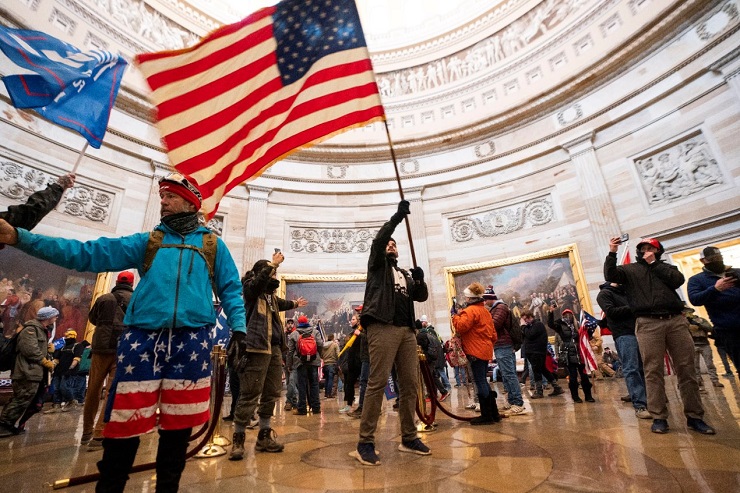“The US and Fake Democracy,” “The American Picture with Iraqi Flavor,” and “The Rising End of US Exceptionalism and Trumpism.” “America. The Tests of Freedom and Responsibility.” These and similar headlines precede the Arab media’s coverage of the storming of the US Congress on January 6 this year. This event and its repercussions caused and continue to cause a flood of diverse responses.
A number of Middle Eastern political analysts compare what happened in Washington to outbreaks of violence in countries in their region. Thus, the Iraqi author recalls the storming by supporters of the radical Imam M. Al-Sadr of the national parliament building in Baghdad in 2016 during mass protests. Another describes the 1979 attempted seizure of the Al-Haram Mosque in Mecca by a group of religious fanatics. A third draws a parallel between the picture of hundreds of heavily armed American National Guardsmen filling the corridors of the Capitol and the Arab soldiers’ involvement in coups that have taken place in the region since the 1960s.
According to the Kuwaiti newspaper Al-Anba, the Capitol attack will continue to dominate analyst and political circles around the world for a long time to come. It cannot be considered a purely internal matter of a country that for decades pretends to be the vanguard of democracy, human rights and freedoms on the planet. If this had happened somewhere in a third-world country, you can only imagine the uproar and the price that would have been paid.
After that, Middle Eastern authors ask, will Washington be able to hand out maturity certificates to states in different parts of the world, as it has been doing before. Even if it has taught and praised some, it has pressured and treated others as outcasts in the international community.
The US messianism reflected on Iraq and its people when soldiers from across the ocean showed their brutality under the slogan of defending the values of freedom and human rights outside the country. The authors recall their crimes at Abu Ghraib prison in Iraq and at Fallujah during the US aggression and occupation of Iraq. The military was following orders from their superiors, who reported to then-Republican President George W. Bush and his team, who planned and executed the takeover of Iraq.
Many commentators focus on the internal background to what happened at the Capitol. According to the Arab Americanist M. Al-Munshawiya, the events of January 6 in the United States were even more serious than the Japanese attack on American Pearl Harbor in 1941 or the terrorist attack on September 11, 2001 in the United States. After all, this incident is purely for internal reasons, and the result of what political polarization has brought the US to.
Racial discrimination, intolerance, and chauvinistic sentiments have been built up over the years and fed from the same source – the hatred, the hubris that has long motivated the spirit of American cowboy superiority over others, of exceptionalism in international affairs. The presence of hundreds of extremist organizations on websites and social networks and the appearance of their marginal supporters on the streets was not a passing phenomenon, the authors in the region believe. This allowed them to rise to the level of parallel political activism and influence America, as shown by the raid on the Capitol.
The image of the great power has suffered immensely, in the eyes of the Arabs it appeared “unsure of itself, shaky”. The difficulty with which the largest country in the world passes the test of the regular transfer of power after re-election, and the great political price it pays for it, have caused amazement everywhere.
The media, especially those in the Gulf countries, traditional allies of Washington, are visibly discouraged by these facts. Since the end of World War II, the United States has taken on the role of leader of the Western world, relying on its economic, military and other power. But lately the balance of international power has begun to change. China emerged as a powerful rival, and Russia began to rise as a traditional opponent of Washington. The US has seen a setback in a number of indicators as the world’s center of power and influence.
The US under Donald Trump has begun to declare its desire to withdraw from its global responsibility and to abandon previous treaties and leave a number of international organizations. In addition, Trump has alienated European allies and parted on a number of issues with them. This raised concerns about the possibility of an alliance between the Russian Federation and the PRC.
Nevertheless, a number of authors want to see a glimmer of hope. They expect from the new head of America efforts for a shift away from tension, escalation in relations between the great powers, for the establishment of order in the world, a change from the anarchy that Trump’s course of adventurism and blackmail has brought, says the Algerian political scientist. The world is set up for a return to a certain degree of now lost balance and political stability, something in the interest of everyone. It expects that the new administration will be able to act in a way that will positively affect its relations with the PRC and with Russia.
On the other hand, there are calls in the Middle East media space not to overanalyze what is going on in the US. The Arabs need not forget the damage done by Trump’s decision on Jerusalem as Israel’s “one and indivisible” capital and the recognition by the US of Israel’s sovereignty over the Golan Heights, states the pan-Arab newspaper Al-Quds. The US should be more concerned with addressing and solving their own burning problems.
Yuri Zinin, a senior researcher at the Center for Middle Eastern Studies, Institute of International Studies of the Moscow State Institute for International Relations, exclusively for the online magazine “New Eastern Outlook”.
